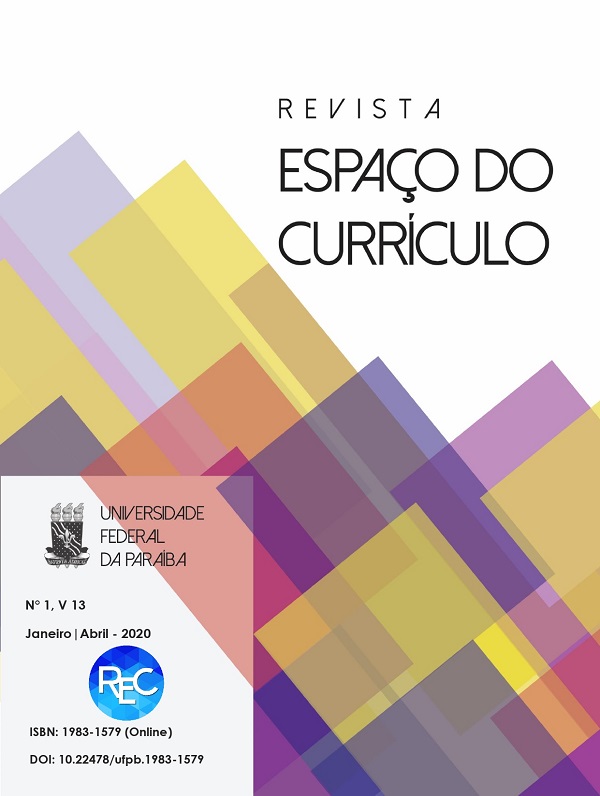RESIST CRYSTALLIZED KNOWLEDGE TO PRODUCE OTHERING RESULTS IN THE CURRICULUM
DOI:
https://doi.org/10.22478/ufpb.1983-1579.2020v13n1.50417Keywords:
Curriculum, Resistance, Othering., HomosexualityAbstract
In this text, inspired by the post-critical perspective of curriculum and post-structuralist authors, we seek to explore the functioning of the LGBTQI + Resistance for Democracy group curriculum, organized on Facebook. Considering the discursive plot of this curriculum and its relations of knowledge-power around homosexualities, we show that there is a call to think in another way to become a subject other than himself. We mobilize the curricular sayings to show that there is an investment in the othering, in the insistence of questioning, this being the most common dynamic in this curriculum, that is, betting much more on the questions than on the answers, as a form of problematization, of taking the subjects to think and act differently. Thus, the main argument developed in the article is that resistances, in this curriculum, happen when it is possible to question and move thought in order to know in a different way what is already put, given and in the order of the true, which as an effect enables the other . We say then that this curriculum not only produces forms of knowledge that imply the demand for a certain type of subject, but, immediately, it implies that that subject is willing to ignore it.
Downloads
Metrics
References
BARROSO, Renato Regis. Pajubá: o código linguístico da comunidade LGBT. PPGLA Dissertação. Programa de Pós-Graduação Stricto Sensu em Letras e Artes. Manaus. Amazonas. 2017.
BENTO, Thaizy Cristhine Salles. Fernando Pessoa: alteridade e outramento. Faculdade de Filosofia, Letras e Ciências Humanas, São Paulo: Universidade de São Paulo, 2013.
BUTLER, Judith. Corpos em aliança e a política das ruas: notas para uma teoria performativa de assembleia. Rio de Janeiro: Civilização Brasileira, 2018.
BUTLER, Judith. Undoing gender. New York: Routledge, 2004b.
BRITZMAN, Deborah. O que é essa coisa chamada amor – identidade homossexual, educação e currículo. Educação e Realidade, vol, 21, nº1, jan./jun. p.71-96, 1996
CORAZZA, Sandra Mara. O que quer um currículo? Pesquisas pós-críticas em educação. São Paulo: Vozes, 2001.
EVANGELISTA, Gislene Rangel. #CurrículodoFacebook: denúncia da crise e demanda pela reforma do Ensino Médio na linha do tempo da escola. 2016. Dissertação (Mestrado em Educação) – Pós-graduação em Educação: Conhecimento e Inclusão Social. Universidade Federal de Minas Gerais. 188f.
FOUCAULT, Michel. História da Sexualidade II. O uso dos prazeres. Rio de Janeiro: Edições Graal, 1984.
______. História da sexualidade I: a vontade de saber. Rio de Janeiro: Edições Graal, 1988.
______. Polêmica, Política e Problematizações. In: FOUCAULT, Michel. Ética, sexualidade, política. Rio de Janeiro: Forense Universitária, 2006.
______. "Sexo, poder e a política da identidade". Verve - Revista do Nu-Sol, nº 5, p. 260-277, 2004.
NETTO JUNIOR, Neurivan Gonçalves. O percurso semântico de alguns vocábulos do pajubá: gírias faladas pelas bichas. 2018. 17 f. Trabalho de Conclusão de Curso (Licenciatura em Letras - Português)—Universidade de Brasília, Brasília, 2018.
PARAÍSO, Marlucy Alves. Currículo e mídia educativa brasileira: poder, saber e subjetivação. Chapecó: Argos, 2007.
______. Currículo, desejo e experiência. Educação e Realidade. Mai/Ago. 2009.
______. Gênero, sexualidade e heterotopia: entre esgotamentos e possibilidades nos currículos. In: RIBEIRO, Paula Regina Costa (et al.). Corpo, gênero e sexualidade: resistência e ocupa(ações) nos espaços de educação. Rio Grande: Ed. FURG, 2018, p. 7-28.
PELÚCIO, Larissa. Um flerte com a normalidade. In: MISKOLCI, Richard. Desejos digitais: uma análise sociológica da busca por parceiros on-line. Belo Horizonte: Autêntica. 2017.
OLIVEIRA, Danilo Araujo de.; FERRARI, Anderson.; MACHADO, Nathalye Nallon. “Ninguém solta a mão de ninguém”: conectados/as em rede, resistimos. Práxis Educativa, Ponta Grossa, v. 14, n. 2, p. 659 -677, maio/ago. 2019. DOI: https://doi.org/10.5212/praxeduc.v.14n2.014
SEDGWICK, Eve Kosofsky. The Epistemology of The Closet. Berkeley: The University of California Press, 1990.
SILVA, Tomaz Tadeu da. Terminais: as transformações na política da pedagogia e na pedagogia da política. Petrópolis: Vozes, 1996.
SILVA, Tomaz Tadeu da. O currículo como fetiche: a poética e a política do texto curricular. Belo Horizonte: Autêntica, 2001
ZAGO, Luiz Felipe. Gênero, sexualidade e corpo-currículo na sociabilidade de um site de relacionamentos gay. Em Aberto, Brasília, v. 29, n. 95, p. 109-120, jan./abr. 2016.
Downloads
Published
How to Cite
Issue
Section
License
By submitting an article to Curriculum Space Journal (CSJ) and having it approved, the authors agree to assign, without remuneration, the following rights to Curriculum Space Journal: first publication rights and permission for CSJ to redistribute this article. article and its metadata to the indexing and reference services that its editors deem appropriate.
















